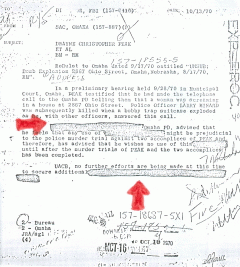J. Edgar Hoover headed the Federal Bureau of Investigation until his death on May 2, 1972. Hoover's controversial forty-eight year tenure at the national police force established a widespread and long-lasting culture of secrecy and deception within the agency. Hoover's many years fighting gangsters and then chasing enemy spies had taught him to operate outside the law and the mandate of his office became what he thought best. For his long misrule, U.S. Senate Majority Leader Harry Reid has sought to remove Hoover's name from FBI headquarters calling it a "stain on the building."
Hoover's "no holds barred" tactics used in the 50's against Communists had by the 70's grown into a massive clandestine operation code-named COINTELPRO that targeted thousands of U.S. citizens and domestic political organizations for surveillance and dirty tricks to "disrupt" legitimate political activity. The Black Panther Party was the primary target and FBI agents took up their charge with lethal ferocity.
In Omaha, Nebraska two COINTELPRO targets, Ed Poindexter and Mondo we Langa (formerly David Rice) headed Omaha's Black Panther chapter, the Nebraska Committee to Combat Fascism. Both men were blamed by police and prosecutors for the August 17, 1970 bombing murder of Omaha police officer Larry Minard and were charged with his murder despite the confession of 15 year-old Duane Peak. Prosecutors would cut a deal with Peak allowing him freedom after several years of juvenile detention in exchange for his testimony implicating Poindexter and Langa.
At the time of the murder trial in April 1971, COINTELPRO was still largely unknown to the American public. The jurors had no idea Hoover had ordered that no report be made of a critical voice analysis in the case. The break-in at a satellite FBI field office in Media, Pennsylvania on March 8, 1971, three weeks before the Omaha trial, led to the first public revelations of the massive clandestine operation when secret COINTELPRO documents were discovered. Meanwhile in Nebraska, withheld from defense attorneys and kept from jurors, the recorded voice of Larry Minard's killer to the police emergency hotline was the subject of Hoover's direct command.
Ivan Willard Conrad, head of the FBI Crime Laboratory, was on the inside track of COINTELPRO's misdeeds and had received a memo written on the day of the bombing urging him to withhold a formal forensic report of the emergency tape vocal analysis. Conrad then talked with Hoover over the phone about the unusual request, recording the FBI director's answer with a scrawled notation, "Dir advised telephonically & said OK to do." Conrad initialed and dated the memo entry and followed orders never issuing a formal lab report on the Omaha tape.
In 1974 and 1976, Congress passed amendments to the Freedom of Information Act allowing individual citizens to examine their own government files. Mondo we Langa requested his COINTELPRO file receiving a heavily redacted partial file from FBI headquarters.
One redacted COINTELPRO memorandum dated 10/13/70 was released under Mondo's Freedom of Information request several years after Hoover's death and was from the Special-Agent-in-Charge of the Omaha FBI office to Hoover discussing evidence which "might be prejudicial to the police murder trial" against the two Panther leaders, described as "accomplices" in the COINTELPRO memo.
Blotted out of the released memo was the identity of the Omaha Police Department officer who told the FBI that he wanted "no use" of the prejudicial evidence and two descriptions of the evidence to be withheld from disclosure to the Panther defendants. The redacted COINTELPRO document can be found in a basement storeroom of the Douglas County Courthouse where post-conviction files are buried away and is marked as Exhibit D in one of the thick court file binders.
Later, another copy of the same 10/13/70 memo was released with fewer redactions and is now in possession of Nebraskans for Justice. The second redacted version reveals the identify of the COINTELPRO contact within the Omaha Police, Assistant Chief of Police Glen W. Gates, who wanted information about evidence withheld until after the trial.
The second memo also reveals what the FBI censors kept from Mondo we Langa. The "prejudicial" evidence was "tapes of this call" made by Minard's killer and that "additional tape recordings of the original telephone call" were not to be made at the request of the Omaha Police Department.
Although Hoover was dead, FBI censors continued to deny the imprisoned Black Panthers critical information about the withholding of a formal report on the voice of Larry Minard's killer by blotting out references to the tape from the COINTELPRO memo.
Ed Poindexter now has a new trial request pending before the Nebraska Supreme Court over the withheld tape recording and conflicting police testimony about dynamite allegedly found by detectives. No date for a decision has been announced.
Ed Poindexter and Mondo we Langa remain imprisoned at the maximum-security Nebraska State Penitentiary in Lincoln. Both men deny any involvement in the death of Larry Minard.
***
Permission granted to reprint





